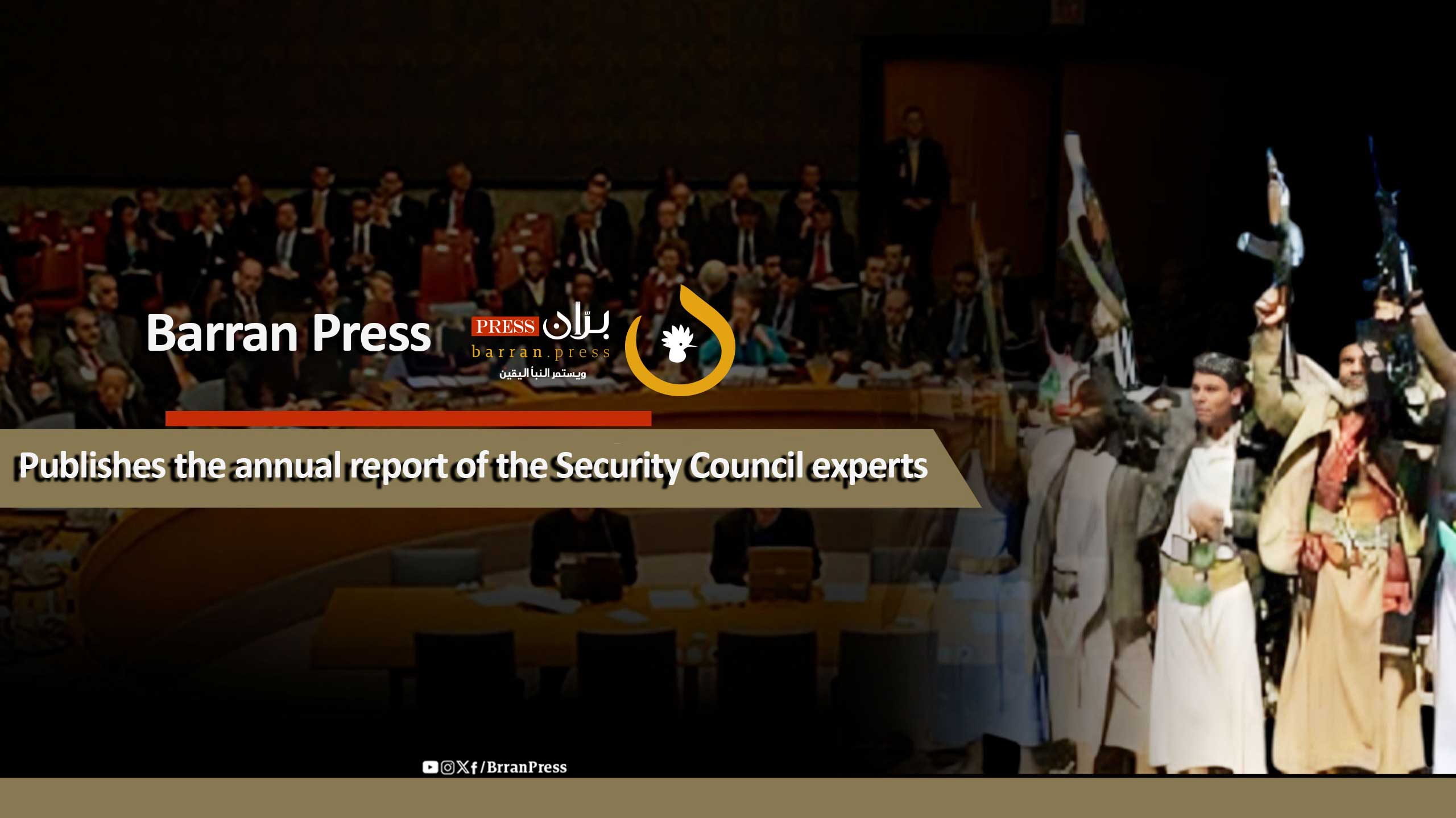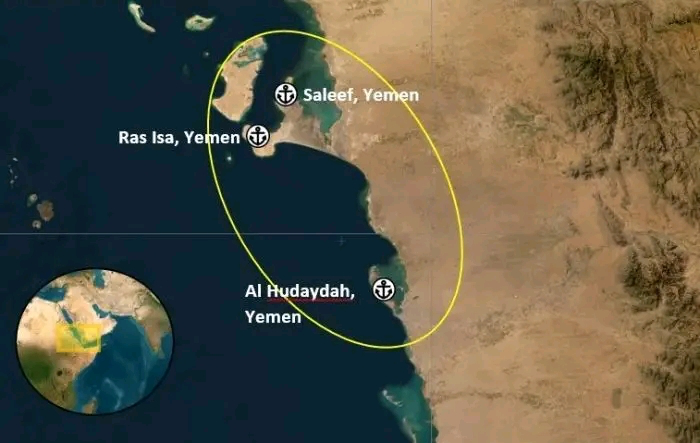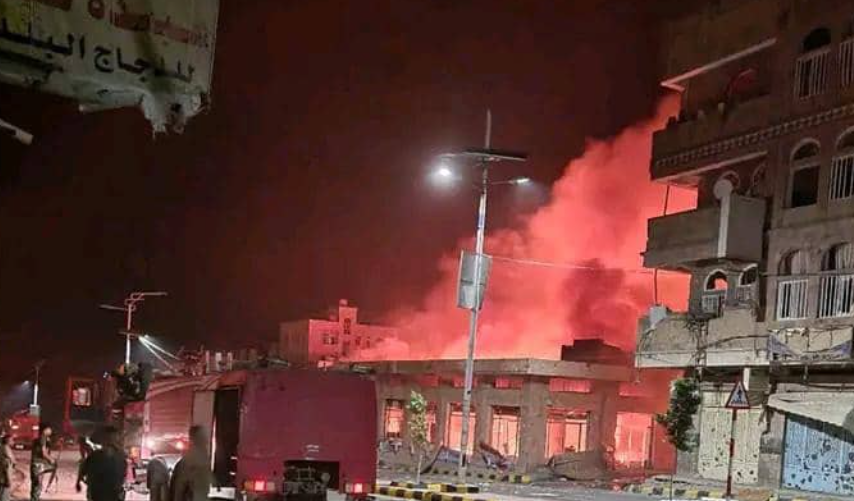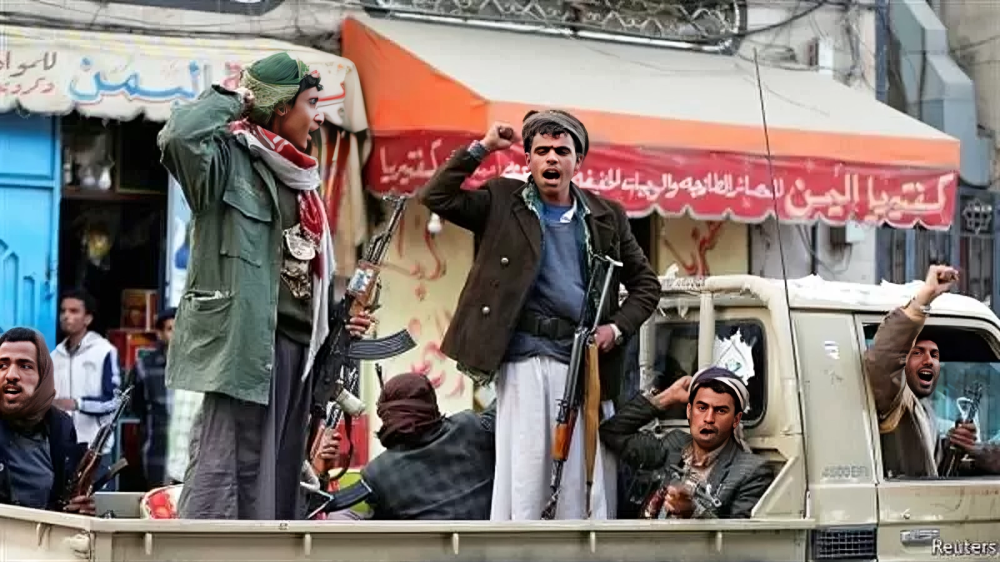
Barran Press
The UN Security Council's Panel of Experts on Yemen has reported a "growing collaboration" between the Houthi movement and terrorist organizations such as Al-Qaeda in the Arabian Peninsula and Al-Shabaab from Somalia, raising significant concerns about regional stability.
In their annual report addressed to the Security Council on October 11, 2024, which was obtained by “Barran Press,” the panel discussed the nature of the conflict in Yemen, the implications of external support for the Houthis, and their escalating military actions both domestically and internationally.
The report outlines the ongoing economic war in Yemen and its effects on the living conditions of its citizens, as well as human rights violations, including child recruitment, the politicization of education, death sentences, and landmine deployment.
Major International Crisis
The panel noted, “The conflict in Yemen, which began a decade ago as an internal armed struggle, has now escalated into a significant international crisis.”
It pointed out that the recent Gaza conflict has shifted regional dynamics, leading to indirect repercussions that have stalled the Yemeni peace process. The experts emphasized that a peace agreement could only be reached when regional conditions are favorable and the Houthis cease their attacks on vessels in the Red Sea.
The report further indicated that the Houthis have exploited regional instability to strengthen their ties with the “Resistance Axis,” in violation of the sanctions imposed under Security Council Resolution 2140 (2014).
Increasing Iranian Support
The panel reported evidence of the Houthis receiving technical assistance, training, weapons, and financial support from Iran, Iraqi armed groups, and Hezbollah. They highlighted the establishment of joint operational centers in Iraq and Lebanon, which include Houthi representatives, aimed at coordinating military actions within the Resistance Axis.
The report expressed alarm over the increasing cooperation between the Houthis and terrorist groups, stating, “The alliance formed between the Houthis and these organizations against the Yemeni government is concerning.”
Collaboration with Terrorist Groups
The report detailed an agreement between the Houthis and terrorist organizations to halt internal conflicts and coordinate arms transfers and attacks against Yemeni government forces. Increased smuggling activities, particularly of small arms and light weapons, have been observed between the Houthis and Al-Shabaab, indicating potential military supply chains.
The panel warned that sanctions imposed on the Houthis would have limited impact unless appropriate measures are taken against all violators of the sanction’s regime.
Unprecedented External Support
The report mentioned “unprecedented” external support for the Houthis, including substantial transfers of military equipment and technology, as well as financial support and training for their fighters. It described a military parade held by the Houthis in Sanaa in September 2023, showcasing various missile systems, anti-ship missiles, drones, and fast attack vessels, asserting that the Houthis lack the capacity to develop most of this technology without external assistance.
Since January 2023, the Yemeni government has intercepted numerous dual-use military materials, while the United States recently seized two vessels in international waters believed to be carrying lethal equipment destined for Houthi-controlled areas.
Gradual Escalation
The report highlights Houthi operations in the Red Sea, noting their "gradual escalation strategy" that targets commercial and naval vessels. It references the hijacking of the Galaxy Leadership on November 19, 2023, stating that its 25 crew members, of various nationalities, remain detained.
In response to these actions, the report mentions the formation of an international naval coalition aimed at deterring Houthi attacks and ensuring freedom of navigation. However, the Houthis have not been deterred, continuing their assaults on ships, including at least 134 attacks on vessels, including warships from the UK and the US, using new missile types.
Internal Escalation
Internally, the panel notes that the Houthis are intensifying their military operations against the Yemeni government, attempting to gain ground on multiple fronts. They are reportedly recruiting large numbers of Yemeni youth, undocumented migrants, and mercenaries from Ethiopian tribes.
The experts describe the internal military situation as "fragile," warning that any spark, whether internal or external, could reignite military confrontations.
War Financing
The report addresses the Houthis' ongoing activities to support their military operations and financing networks. It states that they have employed numerous illegal measures to generate significant resources for military purposes.
The Houthis exploit their control over the telecommunications sector to solicit public funds for their drones, which serve as their "air force," and for their "coastal defense forces" by sending millions of messages to subscribers of telecommunications companies.
Additionally, the panel noted that the Houthis utilize various networks operating under multiple jurisdictions, including shell companies and currency exchange firms, to fund their activities, particularly in the oil and gas sector.
Ongoing Smuggling and Limited Sanctions
Regarding smuggling, the report indicates that Houthi networks use forged documents, such as certificates of origin, and engage in ship-to-ship transfers. They regularly deploy vessels that disable automatic identification systems during voyages to evade detection by the ports they visit and to avoid inspections by the UN verification and inspection mechanism.
The report emphasizes that the Houthis continue to employ armed elements illegally to freeze or seize assets from individuals and entities, take control of companies, and engage extensively in smuggling arms, drugs, dual-use communication equipment, pesticides, pharmaceuticals, and Yemeni cultural properties.
It further states that individuals listed under the sanctions regime, along with those acting on their behalf or under their direction, continue to receive financial resources and assets, either directly or indirectly.
Regarding the effectiveness of financial sanctions, the report concludes that their impact is "limited." This is attributed partly to the international community's approach to preventing any negative humanitarian consequences from the sanctions and partly to the Yemeni government's lack of capacity to freeze assets controlled by Houthi-appointed authorities in areas under their control.
Economic Strain and Conflict
The panel's report highlights several attempts by the Houthis to print currency abroad, intensifying competition over financial resources in Yemen. It notes that the Central Bank of Yemen in Sanaa issued a new 100 riyal coin on March 30, 2024, which the Central Bank in Aden subsequently declared counterfeit.
In response to these developments, the Central Bank in Aden recently revoked licenses for six major banks in Sanaa and threatened to disconnect them from the global SWIFT financial network. These banks are involved in numerous international money transfers, particularly for entities controlled by the Houthis.
The report states that this financial blockade has adversely affected Houthi economic interests, prompting threats of renewed conflict and cross-border attacks on vital economic infrastructure in Saudi Arabia. It mentions an attack on the home of the Central Bank governor in Aden, located in Sanaa, and the seizure of his assets by a Houthi-appointed court.
Despite these tensions, the report notes that mediation efforts led by timely stakeholders helped the Central Bank in Aden withdraw its license revocation orders against the banks, averting escalation into war. However, this situation has led to significant dissatisfaction from the Yemeni government and the Southern Transitional Council regarding the international community's response, illustrating how economic issues can escalate into broader conflict.
Threats to Stability
The report details the Houthi attacks on commercial vessels in the Red Sea, stating that these assaults have had a "multiplier effect," with Yemen being the most affected party. It underscores that rising transportation and insurance costs have contributed to increased prices for essential goods globally.
Additionally, the Houthis continue to impose a ban on crude oil exports, depleting foreign currency reserves and further devaluing the Yemeni rial. This has resulted in severe negative consequences for public service delivery in government-controlled areas, leading to regular protests, civil unrest, and disputes between the Southern Transitional Council and the government, threatening the country's political and economic stability.
Ongoing Violations
The report states that violations of international humanitarian law and human rights law persist, particularly by the Houthis. These violations include indiscriminate attacks on civilians and civilian objects, gender-based violence, and torture.
There are numerous reported cases of arbitrary detention and enforced disappearances, as well as obstruction of humanitarian aid delivery. The panel has also documented serious violations of due process, often resulting in death sentences reportedly aimed at suppressing dissent.
Concerns were raised about the arbitrary detention of humanitarian workers by the Houthis, who have been held incommunicado, along with the seizure of assets belonging to humanitarian actors. These actions obstruct humanitarian efforts and hinder the UN's ability to promote peace and security in Yemen.
Furthermore, the recruitment and use of child soldiers threaten the future stability of Yemeni society and prospects for sustainable peace. The report highlights summer camps organized by the Houthis that are used to propagate hatred and violence. Education workers resisting the politicization of the educational system face severe reprisals, including arbitrary detention and enforced disappearance.
Landmine Risks
The panel also addressed the issue of landmines in Yemen, noting that the Houthis are locally producing landmines and employing specific detonation mechanisms that increase the risk of human harm. The demining process has become increasingly dangerous for workers, particularly since the Houthis do not follow a clear plan for landmine deployment.
The report emphasizes the need to comprehensively address these intertwined political, economic, security, and humanitarian violations.
The panel, composed of five members appointed by the UN Secretary-General, assists the sanctions committee in fulfilling its mandate and provides regular reports on the implementation of sanctions and investigations into violations of international law by all parties in the Yemeni conflict.





